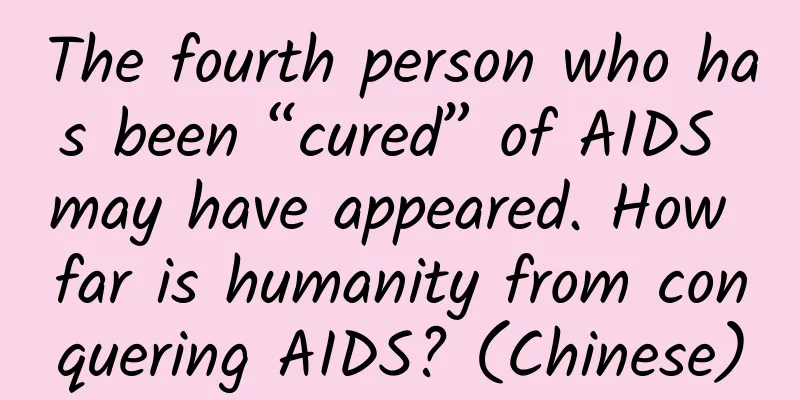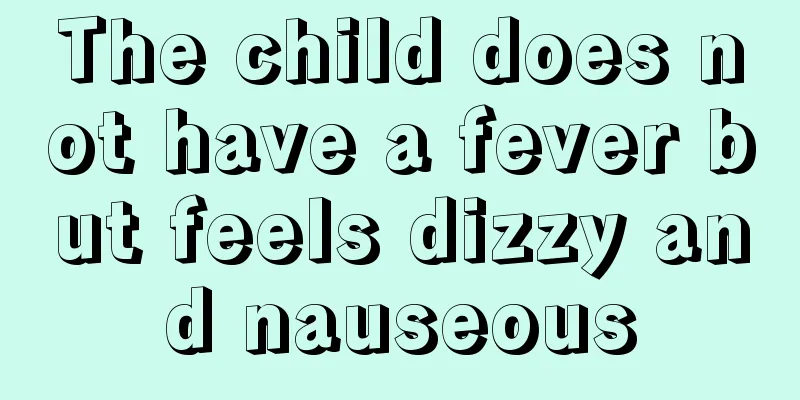The fourth person who has been “cured” of AIDS may have appeared. How far is humanity from conquering AIDS? (Chinese)

|
Produced by: Science Popularization China Author: Lu Xiuyuan (Researcher at Osaka University's Immunology Research Center) Producer: China Science Expo As we mentioned earlier, "once infected, you have to take medicine for life." AIDS is difficult to cure. The medical community has been fighting the AIDS virus for nearly 40 years, and it can only be said that it has ended in a draw: existing medical methods can only use drugs to suppress the virus in HIV-infected people to a low level, keeping the carriers in a non-illness and non-infectious state. So why did the cure still occur? Let's take a closer look. From the "Berlin Patient" to the "City of Hope" The cured patient was treated at the City of Hope Medical Center in Duarte, California, U.S. Because he did not want to reveal his name, he was called a "City of Hope" patient. In the nearly 40 years since AIDS infected humans, the first person to be cured was the "Berlin patient," a miracle. So how did humans take the first step to cure AIDS? How was the first case of AIDS cured? Research on the treatment of AIDS has been difficult, but a breakthrough came when researchers discovered that HIV not only needs CD4 to infect cells, but also another molecule on the cell surface as an aid, most of the time it is CCR5, and a few times it is CXCR4 or other molecules. In other words, if HIV wants to invade the immune system, it must bind to both CD4 and CCR5 on the surface of immune cells at the same time. An immune system without CD4 molecules does not exist, but CCR5 is not essential for the human body. Some people who carry CCR5 mutations (there are no CCR5 molecules on the surface of immune cells) can still live normally. In fact, homozygotes carrying two CCR5 mutant genes are innately immune to AIDS (caused by R5 HIV), but only 1% of people of Northern European descent are homozygous for CCR5 mutant genes. In addition, about 10% of people of European descent carry one CCR5 mutant gene (heterozygote). These people are not completely immune to R5 HIV, but are relatively less susceptible. The process of HIV-1 virus entering immune cells through CD4 and CCR5, source: public domain Researchers speculate that if the immune system is modified into a version without CCR5, the HIV virus may lose the "target" it relies on, thereby achieving the goal of immune regeneration and eliminating the HIV virus. However, this transformation can only be achieved through bone marrow transplantation, which is extremely risky and it is unknown whether it is really effective. For the above reasons, related research has not gained widespread influence until the emergence of the Berlin patient, Timothy Brown. Timothy Brown was infected with HIV as early as 1995, and he has been taking medication for treatment since then. However, in 2006, he was diagnosed with acute myeloid leukemia and his life was in danger. Hematologist Giro Huth was Timothy Brown's leukemia physician, but he was not an AIDS expert. At the time, the only way to save Brown's life was to perform a bone marrow transplant as soon as possible. While preparing for the operation, Dr. Huth had a sudden idea. If a bone marrow donor carrying the CCR5 mutation gene could be found, there would be hope of transforming the patient's immune system while performing the bone marrow transplant, thereby verifying the effectiveness of this therapy. After a difficult search, the 61st person among 80 donors whose bone marrow was successfully matched was found to have a homozygous CCR5 mutation gene. Berlin Patient - Timothy Brown, source: Tumblr After the hematopoietic stem cells carrying the mutated CCR5 were transplanted into the Berlin patient, a miracle happened. Just as Dr. Huth expected, the hematopoietic stem cells from the donor's bone marrow successfully developed into an immune system that was immune to HIV, clearing the HIV virus and making the HIV genes integrated into the Berlin patient's own cells dormant forever. Are the methods used to cure the “City of Hope” patients the same as those used to cure the “Berlin Patient”? With the first cure, the doctors were confident that they would repeat the miracle, but for various reasons, the miracle did not happen again for a long time. Afterwards, whether it was the second "London patient" who was cured or the current "City of Hope" patient, the cure methods were actually in line with the cure method of the "Berlin patient". So, what is the situation of this patient? Does the emergence of this cured case mean that we can overcome the problem of AIDS? Please stay tuned for follow-up. References: https://mp.weixin.qq.com/s/KngdehInM8WzGVKVG7ZXxg https://www.nytimes.com/2020/03/09/health/london-patient-hiv-castillejo-takeaways.html "Long-termcontrolofHIVbyCCR5Delta32/Delta32stem-celltransplantation".TheNewEnglandJournalofMedicine.360(7):692–98. |
Recommend
What should women with kidney deficiency eat? These eight foods are worth recommending
The problem of kidney deficiency makes countless ...
How to choose Wogan? Does Wogan cause internal heat?
Wogan is rich in vitamin C, and it also contains ...
How many days of pregnancy is normal for delivery
For many women, when they will give birth is a qu...
Pregnant stomach is bigger than belly boy
After pregnancy, pregnant women will experience e...
How long does it take to get menstruation after taking progesterone tablets?
Low progesterone levels in women's bodies can...
Swallowing disorders are not scary, home care can help
Dysphagia is one of the common geriatric syndrome...
It turns out that the metastatic path of lung adenocarcinoma is like this
The following article is from the Popular Health ...
Boys can't touch girls' parts
Because the physiological characteristics of men ...
40 weeks of pregnancy signs of labor
It is said that pregnancy lasts ten months and de...
Eating the wrong food can damage your brain! Follow these 4 dietary guidelines to keep your brain younger
As we age, many people begin to complain that the...
Is a 6 cm ovarian cyst serious?
In recent years, the incidence of ovarian cysts h...
What to do if your breasts don't gather
We all know that women's breasts must not onl...
What should I do if I get pregnant again two months after a miscarriage?
Whether it is a natural miscarriage or an artific...
Pictures of late stage of female seborrheic alopecia
In modern life, there are so many strange disease...
What can women eat to improve their immunity?
People with poor immunity will naturally have poo...









